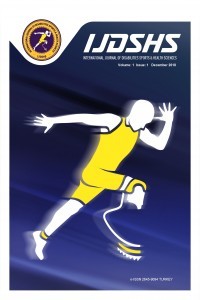Perception Exercise self-efficacy, Body Image and Health-related Quality of Life of Children with Needs Special Education
Perception Exercise self-efficacy, Body Image and Health-related Quality of Life of Children with Needs Special Education
In this study, it was aimed to examine the body ımage, exercise self-efficacy and health-related quality of life of children with special education needs. Participants of this study were selected from volunteer students in five and eight classes in state school in Mersin during the 2016-2017 academic year. The study group consists of a total of 95 students, 52 of which require special education and 43 of which are healthy. The Health Related Quality of Life Scale (Kid-KINDL) was used to describe the quality of life of healthy and specialist training groups, the Exercise Self-Efficacy Scale (ESS) and the Body Image Scale (BIS) were used to determine exercise levels. According to findings; When the groups’ physical characteristics were compared, a significant difference wasn’t observed in terms of age between them (p> 0.05). However, when compared with healthy group special education group body height, weight and VKI, there was a significant difference at p <.001 level. There was no significant difference between the groups in the friendship subscale of the HRQL-KINDL scale (p> 0.05). However, the total quality of life, physical well-being, emotional well-being, school, self-esteem and family subscales scores of the healthy group were significantly higher than the special education group (p <0.001). Similarly, healthy group ESL and BIS were found to be higher than special education group (p <0.001). As a result of this study, it was seen that the of health group have higher exercise self-efficacy and body image and health-related quality of life than special education group.
Keywords:
Exercise Self-Efficacy, Quality Of Life Body Image,
___
- Demirci N., Demirci Toptaş P., Demirci E (2017). The Effect of School-based Exercise Practices of 9-11 Year Old Girls Students on Obesity and Health-related Quality of Life, Universal Journal of Educational Research 5(8): 1323-1331,Diener E, Suh E M, Lucas R E, Smith H L (1999). Subjective well-being: Three decades of progress. Psych Bulletin, 123(2):276–303. Eser F, Yüksel H, Baydur H, Erhart M, Saatlı G, Özyurt B C, Özcan C, Sıeberer U R. (2008). The Psychometric properties of the new Turkish generic health-related quality of life questionnaire for children (Kid-KINDL).Turkısh Journal of Psychiatry; 19(4): 409-417.
- Yayın Aralığı: Yılda 3 Sayı
- Başlangıç: 2018
- Yayıncı: Nevzat DEMİRCİ
Sayıdaki Diğer Makaleler
Gökhan UMUTLU, Nasuh Evrim ACAR, Yağmur AKKOYUNLU
Erkan Gülgösteren, Mehmet Akif ZİYAGİL, Pervin TOPTAŞ DEMİRCİ, Ali DEMİRCİ
Students What Should Be Minded When Families With Disabled Children Are Planning A Summer Vacation?
